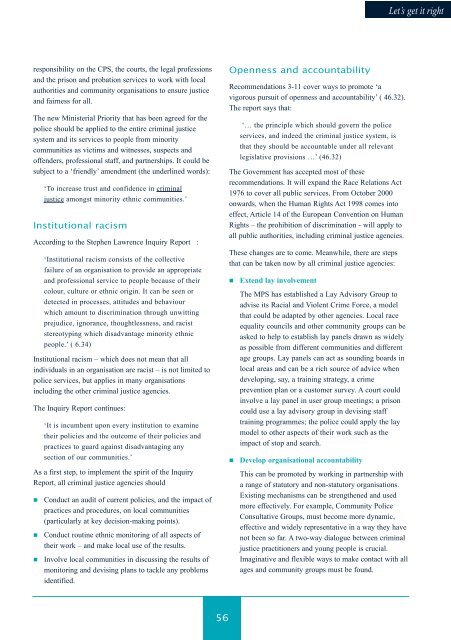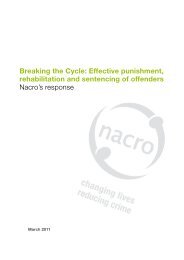Let's get it right: race and justice 2000 - Nacro
Let's get it right: race and justice 2000 - Nacro
Let's get it right: race and justice 2000 - Nacro
- No tags were found...
You also want an ePaper? Increase the reach of your titles
YUMPU automatically turns print PDFs into web optimized ePapers that Google loves.
Let’s <strong>get</strong> <strong>it</strong> <strong>right</strong>responsibil<strong>it</strong>y on the CPS, the courts, the legal professions<strong>and</strong> the prison <strong>and</strong> probation services to work w<strong>it</strong>h localauthor<strong>it</strong>ies <strong>and</strong> commun<strong>it</strong>y organisations to ensure <strong>justice</strong><strong>and</strong> fairness for all.The new Ministerial Prior<strong>it</strong>y that has been agreed for thepolice should be applied to the entire criminal <strong>justice</strong>system <strong>and</strong> <strong>it</strong>s services to people from minor<strong>it</strong>ycommun<strong>it</strong>ies as victims <strong>and</strong> w<strong>it</strong>nesses, suspects <strong>and</strong>offenders, professional staff, <strong>and</strong> partnerships. It could besubject to a ‘friendly’ amendment (the underlined words):‘To increase trust <strong>and</strong> confidence in criminal<strong>justice</strong> amongst minor<strong>it</strong>y ethnic commun<strong>it</strong>ies.’Inst<strong>it</strong>utional racismAccording to the Stephen Lawrence Inquiry Report :‘Inst<strong>it</strong>utional racism consists of the collectivefailure of an organisation to provide an appropriate<strong>and</strong> professional service to people because of theircolour, culture or ethnic origin. It can be seen ordetected in processes, att<strong>it</strong>udes <strong>and</strong> behaviourwhich amount to discrimination through unw<strong>it</strong>tingprejudice, ignorance, thoughtlessness, <strong>and</strong> raciststereotyping which disadvantage minor<strong>it</strong>y ethnicpeople.’ ( 6.34)Inst<strong>it</strong>utional racism – which does not mean that allindividuals in an organisation are racist – is not lim<strong>it</strong>ed topolice services, but applies in many organisationsincluding the other criminal <strong>justice</strong> agencies.The Inquiry Report continues:‘It is incumbent upon every inst<strong>it</strong>ution to examinetheir policies <strong>and</strong> the outcome of their policies <strong>and</strong>practices to guard against disadvantaging anysection of our commun<strong>it</strong>ies.’As a first step, to implement the spir<strong>it</strong> of the InquiryReport, all criminal <strong>justice</strong> agencies shouldConduct an aud<strong>it</strong> of current policies, <strong>and</strong> the impact ofpractices <strong>and</strong> procedures, on local commun<strong>it</strong>ies(particularly at key decision-making points).Conduct routine ethnic mon<strong>it</strong>oring of all aspects oftheir work – <strong>and</strong> make local use of the results.Involve local commun<strong>it</strong>ies in discussing the results ofmon<strong>it</strong>oring <strong>and</strong> devising plans to tackle any problemsidentified.Openness <strong>and</strong> accountabil<strong>it</strong>yRecommendations 3-11 cover ways to promote ‘avigorous pursu<strong>it</strong> of openness <strong>and</strong> accountabil<strong>it</strong>y’ ( 46.32).The report says that:‘… the principle which should govern the policeservices, <strong>and</strong> indeed the criminal <strong>justice</strong> system, isthat they should be accountable under all relevantlegislative provisions …’ (46.32)The Government has accepted most of theserecommendations. It will exp<strong>and</strong> the Race Relations Act1976 to cover all public services. From October <strong>2000</strong>onwards, when the Human Rights Act 1998 comes intoeffect, Article 14 of the European Convention on HumanRights – the prohib<strong>it</strong>ion of discrimination - will apply toall public author<strong>it</strong>ies, including criminal <strong>justice</strong> agencies.These changes are to come. Meanwhile, there are stepsthat can be taken now by all criminal <strong>justice</strong> agencies:Extend lay involvementThe MPS has established a Lay Advisory Group toadvise <strong>it</strong>s Racial <strong>and</strong> Violent Crime Force, a modelthat could be adapted by other agencies. Local <strong>race</strong>equal<strong>it</strong>y councils <strong>and</strong> other commun<strong>it</strong>y groups can beasked to help to establish lay panels drawn as widelyas possible from different commun<strong>it</strong>ies <strong>and</strong> differentage groups. Lay panels can act as sounding boards inlocal areas <strong>and</strong> can be a rich source of advice whendeveloping, say, a training strategy, a crimeprevention plan or a customer survey. A court couldinvolve a lay panel in user group meetings; a prisoncould use a lay advisory group in devising stafftraining programmes; the police could apply the laymodel to other aspects of their work such as theimpact of stop <strong>and</strong> search.Develop organisational accountabil<strong>it</strong>yThis can be promoted by working in partnership w<strong>it</strong>ha range of statutory <strong>and</strong> non-statutory organisations.Existing mechanisms can be strengthened <strong>and</strong> usedmore effectively. For example, Commun<strong>it</strong>y PoliceConsultative Groups, must become more dynamic,effective <strong>and</strong> widely representative in a way they havenot been so far. A two-way dialogue between criminal<strong>justice</strong> pract<strong>it</strong>ioners <strong>and</strong> young people is crucial.Imaginative <strong>and</strong> flexible ways to make contact w<strong>it</strong>h allages <strong>and</strong> commun<strong>it</strong>y groups must be found.56

















